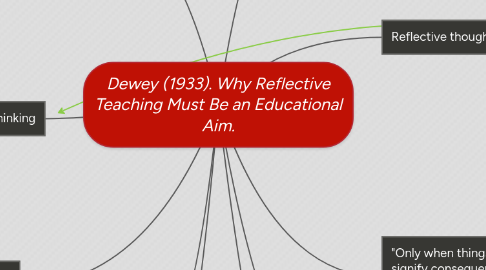
1. “compare a thing or event as it is be/ore, with what it is after, he has obtained intellectual mastery over it” (p. 215).
1.1. If the thing or event is teaching, the practice can be new and after it has been experienced does not mean the teacher has intellectual mastery because the theory does not have to be part of the experience. We hope both theory and practice are employed but if not does that change this particular definition of reflection?
2. "While the power of thought, then, frees us from servile, subjection to instinct, appetite, and routine, it also brings with it the occasion and possibility of error and mistake" (p. 217).
2.1. "Conclusions may be accepted merely because the suggestions are vivid and interesting, while a large accumulation of dependable data may fail to suggest a proper conclusion because of opposition from existing customs" (p. 218)
2.2. Any new idea, program, change in education, so many hop on board right away because what we have now is not working. Is it not working because we are not invested enough in it and we are looking for a quick fix?
2.2.1. According to Dewey (1933), reflection does not automatically happen (p. 216). Which could be one reason we are quick to grasp at some new strategy or idea. We are able to reflect at the "savage" level which only reveals there is something not working. It does not go beyond this to discover what exactly is not working and extract meaning for the future.
3. Separates rational human life and animals
4. Causes of bad thinking
4.1. Erroneous methods, language or communication, individual beliefs, and sources of current news. (Dewey, 1933, p. 220).
4.2. Locke says putting passion in front of reason
4.2.1. I can be passionate about teaching but if I do not have purpose or intent then I cannot fully experience my passion
4.3. Those blocked off to others (Dewey, 1933, p. 221). Importance of community in quality teaching, without openness teachers remain unwilling to change or take necessary risks or challenges.
5. "He pays attention with ear or eye but his brain is occupied with affairs that make an immediate appeal" (p. 225).
5.1. In order to continue to grow as educators we have to be committed to changing and getting better. It is a constant string of thought in the mind of an ever evolving teacher that flows through every situation looking to connect this “appeal”. Dewey (1933) continues “when a person is absorbed, the subject carries him on” and when a teacher has abandoned this occupation of reflection and thinking I believe they are no longer practicing quality teaching or aiming for it.
5.2. Which is why quality teaching must include community in which the all-knowing authority becomes part of the team and more like the team captain rather than the authority that leaves no room for thinking. Authority limits thinking and thinking is what we want students to do, we should be the role models.
6. Reflective thought
6.1. Awareness of purpose
6.2. Frees us from impulsive routine or routine activities
6.2.1. Why is this a bad thing? Why do we need to freed from it?
6.3. It is not about now but what we want out of the future
6.3.1. Anticipate the future, reflect as if you will encounter a similar experience in the future and can use reflection to shape the new experience more to your liking or to more serve its purpose
7. "Only when things about us have meaning for us, only when they signify consequences that can be reached by using them in certain ways, is any such thing as intentional, deliberate control of them possible" (p. 213).
7.1. Meaning does not just happen, we need to have a use for it?
7.2. We give things value and meaning through thought which leads to giving objects significance
7.2.1. Don’t the differences in our thoughts produce different meanings? In thinking about teachers as students, there is a variety of input for reflection but the output will be shaped by our individual thinking. How then, can we really define quality teaching except to say that it is different for each individual teacher? Subject to their experience.
7.2.2. Not until the reflection becomes collective are we able to create the items that move us to what Dewey considers as “civilized men” because the experiences have transformed into a more collective experience.
7.2.2.1. Who then serves as the civilized man? And why is his thinking or reflection more significant than anyone elses?
8. We need to think back and learn from experience
8.1. What we reflect on then leads us to warn or cautions others through our experience
9. Reflect in hopes that you will experience it more expertly next time
9.1. Just because I do not possess expert knowledge does not mean things do not have meaning.
9.1.1. On the other hand, because I never expect to consider myself an expert teacher I will always be looking for that deeper meaning through reflection
9.1.1.1. Researchers and specialists are able to become more expert because of the nature of their work. As Kennedy suggests (2010) the factors in teaching itself make each day a new experience in which we are able to handle better when we embrace Dewey's view of reflection. Researchers or those outside the classroom are many times isolated from these ever changing factors because they are able to focus on a couple or few factors and ignore the others for the time being.
9.1.2. I think a quality teacher knows there are never true expert teachers. While the purpose remains the same in regards to reflection, there are always changing factors that contribute to the reflection and therefore leads to a different outcome.
